【EMI Resource Center】How Corpora Are Reshaping ESP Communication: New Linguistic Perspectives in the AI Era
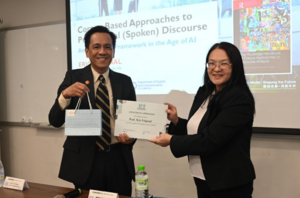
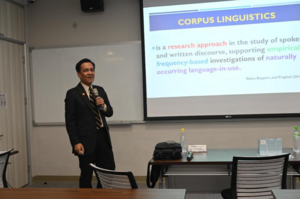
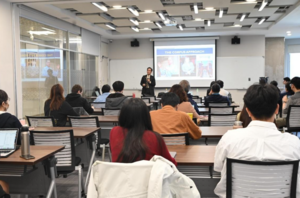
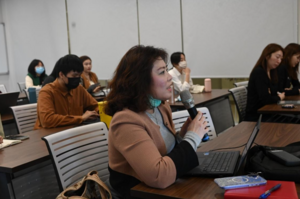
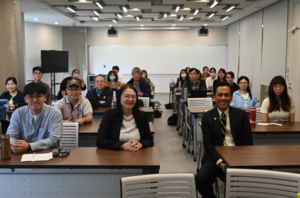
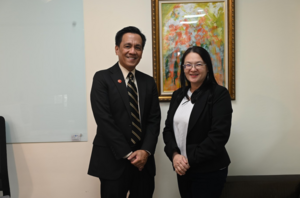
【Article by EMI Resource Center 】
The EMI Resource Center at National Chengchi University (NCCU) hosted an academic lecture on March 10 (Monday) morning in Multi-Function Conference Rooms A and B on the 7th floor of the Daxian Library. The lecture, titled "Corpus-Based Approaches to Professional (Spoken) Discourse: An Integrative Framework in the Age of AI," featured Professor Eric Friginal, Head of the Department of English and Communication at The Hong Kong Polytechnic University, as the keynote speaker. The event delved into how Corpus Linguistics can be applied to English for Specific Purposes (ESP) communication.. The lecture was organized by the EMI Resource Center at NCCU and co-organized by the Linguistic Society of Taiwan and the Department of Applied English at MCU.
The lecture was chaired by Professor Siaw-Fong Chung, Director of the EMI Resource Center at NCCU, who also delivered the opening remarks. Professor Eric Friginal has an extensive academic background. In addition to his role as the Head of the Department of English and Communication at PolyU, he also serves as the Director of the Research Center in Professional Communication in English (RCPCE). Before joining PolyU, he was a Professor and Director of International Programs in the Department of Applied Linguistics and ESL at Georgia State University, USA. His research expertise includes applied corpus linguistics, language policy and planning, technology in language teaching, sociolinguistics, cross-cultural communication, and discipline-specific writing. He is also the founding Co-Editor-in-Chief of Applied Corpus Linguistics (ACORP) and has published extensively in fields such as aviation English, corpus-based research on academic writing, and language assessment.
The speaker began by explaining the basic concepts of Corpus Linguistics (CL), emphasizing how this research methodology uses empirical analysis and frequency-based statistics to study real-world language usage. He introduced the latest developments in corpus linguistics, particularly focusing on the impact of Generative AI and Large Language Models (LLMs) on linguistic research beyond 2025. Additionally, he introduced the Hong Kong Corpus of Spoken English (HKCSE), which includes four sub-corpora: academic, business, conversational, and public speech. The speaker also explored the role of corpus-based approaches in language policy and education, and how corpus linguistics integrates with computational linguistics and natural language processing (NLP) to enhance linguistic analysis.
Furthermore, the speaker showcased eight specialized corpora, covering various professional fields such as outsourced call centers, global aviation, international maritime communication, multicultural workplaces in the U.S., the healthcare industry, hospitality and customer service, augmentative and alternative communication (AAC) in workplaces, and U.S. academia. Using real-world examples, he analyzed linguistic features and policy implications within these fields. One of the key discussions focused on aviation and maritime communication, where English serves as the lingua franca. He highlighted historical aviation accidents caused by language miscommunication, including the 1990 New York plane crash, where a misunderstanding regarding "fuel shortage" led to a tragic incident, and the 1996 India air disaster, where language barriers among crew members of different nationalities contributed to the crash.
The speaker then further examined language policy and planning (LPP) in professional settings, discussing how language policies influence communication in specific industries. For example, in aviation and maritime communication, overly indirect expressions can reduce the clarity of instructions and affect operational efficiency. The speaker also analyzed the politeness strategies of flight attendants in cross-cultural interactions, emphasizing that while the aviation industry promotes an "appropriate level of politeness," excessive or insufficient politeness can impact service experience. For instance, Filipino and American flight attendants demonstrate distinct communication styles. Filipino flight attendants typically prioritize politeness, frequently using phrases like "Sir/Ma’am" and "Thank you for your patience." In contrast, American flight attendants tend to adopt a more direct communication style to enhance efficiency.
The speaker explained that Filipino flight attendants' emphasis on politeness stems from deep-rooted cultural and historical influences, where linguistic norms have shaped service-oriented industries, particularly in aviation. However, the speaker pointed out that excessive politeness does not necessarily equate to high-quality service. Studies have shown that customer ratings of service quality are not directly correlated with politeness. In many cases, customers prioritize problem-solving efficiency and accuracy over excessive courtesy. Sometimes, overly polite expressions may lead to misunderstandings, prolong communication unnecessarily, or reduce the immediacy of essential information. Thus, in industries like aviation and customer service, ensuring clear and direct communication is often more effective than merely increasing polite expressions.
In the latter half of the lecture, the speaker explored the role of AI in language research and professional communication, particularly how AI-driven voice assistants impact human-machine interactions. He introduced the Test Voice Assistant Corpus (T-VAC), a study on how AI-based customer service agents simulate human speech patterns. The findings revealed that although AI-powered customer service bots can mimic human conversations, they still lack sufficient pragmatic understanding in certain contexts. The speaker also discussed the growing role of AI in cross-cultural communication, particularly the advancements in automated translation and speech recognition technologies, which are reshaping language training and workflow management in global enterprises.
Finally, the speaker demonstrated the progress of AI-generated speech and video synthesis, including Synthesia technology, which allows for the creation of virtual speakers. He reminded the audience of the potential impact of AI on language learning, language assessment, and cross-cultural communication. He emphasized that in the future of linguistic research, the integration of AI and corpus analysis will become mainstream, potentially transforming traditional approaches to language education and assessment.
This insightful lecture provided a comprehensive exploration of corpus linguistics in professional communication, while also offering critical perspectives on the future of language policy, education, and technology. The speaker underscored that as AI technology continues to advance, corpus-based research will become more refined, offering academia and industries stronger linguistic data support.
The event attracted scholars and students from various fields, including linguistics, education, communication, and technology, fostering lively discussions on the interdisciplinary applications of corpus linguistics. The EMI Resource Center at NCCU remains dedicated to promoting language teaching and research, and will continue to host similar academic events to encourage cross-disciplinary collaboration and exchange.
Website:https://www.eminccu.com/
Facebook:https://www.facebook.com/nccu.emi
Instagram:https://www.instagram.com/nccu.emi
